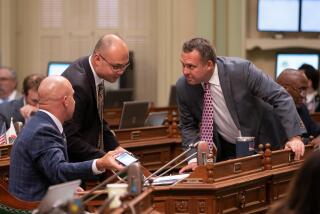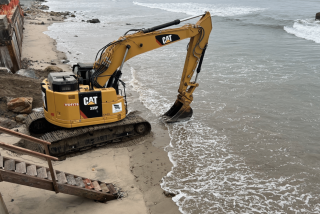Grand Jury Asks D.A. to Review Leases at Marina : Development: It wants Garcetti to determine if laws were broken or procedures ignored in negotiation of long-term deals for prime real estate.
- Share via
The Los Angeles County Grand Jury has called for the district attorney to investigate long-term leases that the county granted to private developers on choice waterfront property in Marina del Rey, The Times has learned.
The grand jury wants Dist. Atty. Gil Garcetti to determine if any laws were broken or procedures ignored when the county renegotiated leases on valuable county-owned marina property in 1989, according to two members of the panel.
“The county was a loser in each one of these leases,” said one grand juror, who asked not to be identified. “Was it ignorance, stupidity or duplicity?”
A spokeswoman for the district attorney said Garcetti had not received the grand jury’s request and would have no comment. Grand jury adviser Terry White, a deputy district attorney, said he has not had time to prepare the formal referral to the district attorney but plans to do so in the near future. He added that the district attorney is not obligated to act on a grand jury referral.
The grand jury, which finished its term June 30, stated in its final report that it had conducted a preliminary investigation into the marina. Two grand jurors said the panel decided the leases warranted further examination and voted to refer the case to the district attorney in part because members felt they lacked the expertise to evaluate the complex agreements.
Most of Marina del Rey is owned by Los Angeles County, which leases it on a long-term, generally 60-year, basis to a small group of developers who operate the harbor’s apartments, hotels, boat slips, restaurants and shops. The vast majority of the marina properties are controlled by a handful of developers, who also have been significant campaign contributors to the county Board of Supervisors.
A yearlong Times study of the marina published in April, 1992, found that the partnership between the county and the leaseholders had primarily benefited the developers at the expense of the public.
Independent real estate experts consulted by The Times concluded that the marina leases were generating far less rental income for the county than they should given the value of the prime waterfront property. The experts also said the county made a big financial concession to the leaseholders when new rent levels were negotiated in 1989.
County officials, who challenged The Times’ conclusions, have said the renegotiated rents were the best they could obtain after years of deadlock with the leaseholders. The county’s income from apartments and boat slips was adjusted upward, although not as high as recommended earlier by appraisers for the county.
The grand jury stated in its report that it had conducted a preliminary inquiry into a citizen complaint alleging “improprieties” in granting leases in Marina del Rey. The report said “one aspect” of that inquiry should be referred to the district attorney.
That aspect, according to the grand jury sources, is whether the leases are legal and the negotiations were properly conducted. The grand jurors asked not to be identified because they are prohibited from talking about their proceedings.
The grand jury also referred the marina issue to the newly installed 1994-1995 grand jury for consideration, according to interviews and documents obtained by The Times.
“We wanted to be sure that the (lease) process was fair and legal,” said one grand juror. “Mostly that it was legal.”
The county’s negotiations on the marina leases were overseen by former Chief Administrative Officer Richard B. Dixon, who left county service in a cloud of controversy over changes in the pension plan last year, and County Counsel DeWitt Clinton. Los Angeles Mayor Richard Riordan, who at the time was a private attorney, was hired by the county to assist in the negotiations. The Board of Supervisors also played a critical role in shaping the county’s marina leasing policy, especially Supervisor Deane Dana, who represents the marina area.
“You can always argue if it was a good deal or not,” said Dixon, when told of the grand jury action. But he said he does not believe any laws were violated. Clinton could not be reached for comment.
Riordan said in a prepared statement that he negotiated a good deal for county taxpayers that resulted in significantly increased rental income. “This action, like any other involving a public body, is rightly subject to thorough review and scrutiny,” he added.
When told of the grand jury’s referral to the district attorney, Dana said, “It’s all right with me. I don’t think they’ll find anything very startling.” Dana said the county’s lease arrangements have been successful for the 30 years since the marina was created and he is satisfied the leases are legal and their terms are fair to the county.
Supervisor Gloria Molina, who has been critical of the leases, said she will personally encourage Garcetti to vigorously pursue the grand jury’s referral. “I’ve had concerns from day one. We have private people gaining tremendous benefit from a public resource.”
The big leaseholders who collectively control about two-thirds of the marina include: lobbyist/attorney Douglas Ring and his uncle, Ellis Ring; developer Jona Goldrich; developer Jerome Snyder, whose marina holdings are now in bankruptcy court; developer Jerry Epstein, who has served on numerous government commissions, and Saudi Arabian investor Abdul Aziz al Ibrahim, a brother-in-law of Saudi King Fahd.
Another longtime marina developer, Abraham Lurie, who sold 49.9% of his holdings to the Saudi investors in 1989, later lost his share of the marina leases in a bankruptcy court battle with his partners.
Lurie had no comment, but said he would be willing to meet with the grand jury to discuss his views of the marina. Snyder said his Marina City Club holdings were not covered by the 1989 rent renegotiations.
Douglas Ring said he was not involved when the original leases were signed, but the grand jury is welcome to look into the rent renegotiation issue.
Goldrich said county negotiators “drove a real tough bargain . . . I don’t see where the grand jury is going to find something wrong with it.”
Epstein could not be reached for comment.
The grand jury opened its inquiry into the marina as a result of a complaint by John Rizzo, a longtime Marina del Rey activist. He presented the grand jury with a videotape in which he was sharply critical of the county’s administration of the harbor.
The tape was “very good” and the complaint was “very comprehensive,” according to another grand juror. “He’s got some good points.”
The jury’s Government Operations Committee began assembling a file on the controversial topic, but was unable to complete its investigation because of the press of other business, budgetary restraints and a concern the panel had a conflict of interest because one member is an officer in a marina yacht club, according to several members. Also, some members felt they had to hand it off to the district attorney because they did not have the necessary expertise.
“The whole thing was so complex,” said one juror.
White said the panel presented him with five volumes of notes concerning the marina that he must review and condense into a formal referral to the district attorney.
The grand jury is a panel of 23 citizens appointed for a one-year term by the Superior Court to hear criminal cases and determine whether there is sufficient evidence to return an indictment. The grand jury is also charged with serving as a guardian against improper or inefficient performance by county government. It has wide statutory powers of inquiry and investigation.
More to Read
Sign up for Essential California
The most important California stories and recommendations in your inbox every morning.
You may occasionally receive promotional content from the Los Angeles Times.










